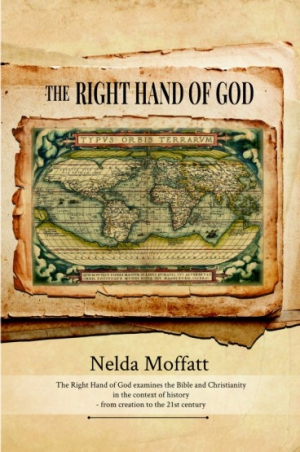The Right Hand Of God
The Right Hand of God offers a broad survey of the theological ideas working behind the scenes of world culture and history.
Nelda Moffatt’s The Right Hand of God is a systematic and extended theological exploration of God’s work in the world, presented from both a biblical and a historical framework.
This conversational book seeks to offer insight into world history, from the prehistoric past to today. Its stated aim is to allow the church to “have an all-encompassing view of history and of the world—within a metaphysical framework that includes all of knowledge—yet is easy to understand.”
The text traces the Bible, book by book and story by story, and places that reading alongside archaeology and history. Frequent maps, diagrams, and charts aid understanding of the subjects. The result is a quick flyover of world history, including the rise and fall of civilizations and various theological and church developments. This chronological construction seeks to highlight the work of God over the ages, starting from the very beginning and ending in Revelation.
The Right Hand of God displays a refreshingly old-fashioned insistence on a clear, singular reading of theological history. This simplicity of purpose allows it to move beyond general questions of salvation history and to look at areas such as Christianity’s connection to Islam.
Some conclusions are problematic, such as the suggestion that the Bible is solely a Christian text. The book also presumes that the Bible is a simple document, clear and easy to read. As such, it does not engage with biblical scholarship, or concern itself with textual dating, language, context, or cultural understanding. The Bible’s use of metaphor, imagery, and symbology is similarly ignored.
The volume’s range is its primary asset. It combines many avenues of human endeavor, including science, culture, empire-building, and philosophy. Its best theological material comes from areas that are often treated as footnotes, as when the Genesis account of God separating day into night is equated to science offering both matter and dark matter.
Prose is uncomplicated and conversational, making for an easy reading of a wide swath of world history. By the work’s own admission, there are moments of “oversimplification” here, likely because of its thumbnail-survey quality. For example, the rise of Genghis Khan is detailed as “shopping for a new religion,” and the Khans didn’t opt for Christianity. It concludes: “An opportunity lost? Maybe. Or maybe God planned to send reformed Christianity to the west, to the New World, instead.”
Here, history remains a purposeful engine of human spiritual evolution set to culminate in a Revelation-defined end-time. The Bible defines history and history props up the Bible, making for a bit of a circular argument.
The Right Hand of God offers a broad survey of the theological ideas working behind the scenes of world culture and history.
Reviewed by
Jeremiah Rood
Disclosure: This article is not an endorsement, but a review. The publisher of this book provided free copies of the book and paid a small fee to have their book reviewed by a professional reviewer. Foreword Reviews and Clarion Reviews make no guarantee that the publisher will receive a positive review. Foreword Magazine, Inc. is disclosing this in accordance with the Federal Trade Commission’s 16 CFR, Part 255.

